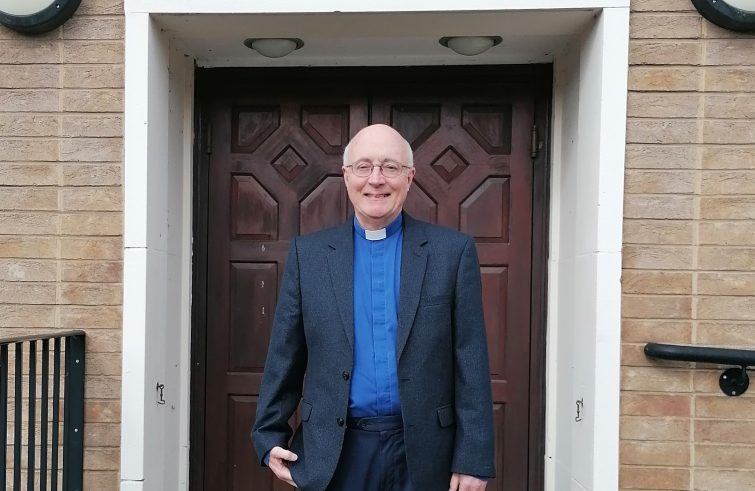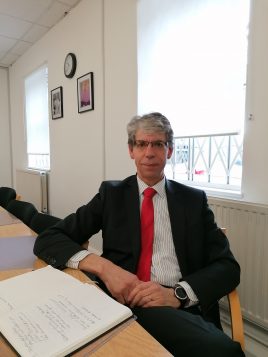
In the Nottingham diocese, covering an area of 13,000 km2 and 125 parishes in the heart of England, Fr Paul Chipchase, who will turn 70 next August, is a notable exception. He is one of a handful of priests still tending to just one flock, that of the Sacred Heart Catholic church in Loughborough, a university town with approximately 190 parishioners attending Sunday Mass. This unusual situation will soon come to an end since, as of next September, this three-time graduate parish priest, who entered the priesthood in his 40s, will also be responsible for St Gregory’s parish in Sileby, eight kilometres away.
The vocations curve. “Throughout its over 2000-year-long history, the Church has faced far greater crises than the lack of vocations. In some respects, the Church has always experienced crises, as she does not belong to this world, and for that reason I trust in God and I am not worried,” Father Paul told SIR, pointing to a chart showing a steeply declining curve of new priestly vocations.
“Nevertheless, we face a challenging situation.”
He points out: “In 1985, 140 priests were below the age of seventy-five, compared to about 50 today. There used to be 158 churches and now there are 133. With no new vocations, there will be less than ten parish priests by the year 2050.” In the last five years, the Nottingham diocese had to close down six churches owing to a lack of faithful, the same fate is bound to befall three more soon. Still, Bishop Patrick McKinney is trying to avoid stripping the faithful of that pew, at Sunday services, which is so dear to them.
Inevitable transformations. “Feelings of strong attachment towards the parish church where people were baptised, got married, and where they celebrated their parents’ funerals are only human, and the parishioners cannot understand why it is so hard for the diocese to guarantee this continuity today,” the parish priest of the Sacred Heart church pointed out. “With this in mind, we have been organising meetings for the past 15 years in which we discuss these problems, in the hope that people will understand that changes such as suspending some Masses, or timetable variations, are unavoidable. The diocese is also bringing in new priests from Nigeria, Thailand and the Philippines, to be ordained before departure for the UK.” He added: “We are also hoping to reach an agreement with some Catholic dioceses in Africa and the Far East, enabling us to promote some of the priestly vocations that abound in those regions.
After a couple of years, the prospective parish priest could join our diocese, where he would complete his studies
and receive further guidance to integrate into our culture, before being ordained here in the UK. This would avoid the so-called ‘culture clash’, frequently seen when an Asian or African parish priest is appointed to a parish in the UK and is plunged into a very materialistic culture that he struggles to come to terms with, not to mention the problem of communicating in a foreign language.”
 Caring for and serving the faithful. “In practical terms, closing down our religious buildings would be a cost-effective and more productive solution,” said David Lawes, head of finance and property for the diocese of Nottingham. “For example, by selling 25 of our churches, roughly 20 per cent, we would be losing very few worshippers, about five per cent, who could go elsewhere. But we ruled it out because it would have a very negative impact on the sense of belonging in these communities. We believe that our mission is to care for and serve the faithful, our flock, although this strategy weighs heavily on our priests. We therefore integrated the pastoral councils into the financial and administrative life of the parishes. We also offer formation to the laity, many of them volunteers, and gave them new financial or administrative roles. The 133 churches open today are not mirrored by the same number of parish communities. The latter total only about fifty. In most cases, when a church is closed, it is after a request from the faithful who attend it, although it is always a painful process.”
Caring for and serving the faithful. “In practical terms, closing down our religious buildings would be a cost-effective and more productive solution,” said David Lawes, head of finance and property for the diocese of Nottingham. “For example, by selling 25 of our churches, roughly 20 per cent, we would be losing very few worshippers, about five per cent, who could go elsewhere. But we ruled it out because it would have a very negative impact on the sense of belonging in these communities. We believe that our mission is to care for and serve the faithful, our flock, although this strategy weighs heavily on our priests. We therefore integrated the pastoral councils into the financial and administrative life of the parishes. We also offer formation to the laity, many of them volunteers, and gave them new financial or administrative roles. The 133 churches open today are not mirrored by the same number of parish communities. The latter total only about fifty. In most cases, when a church is closed, it is after a request from the faithful who attend it, although it is always a painful process.”


